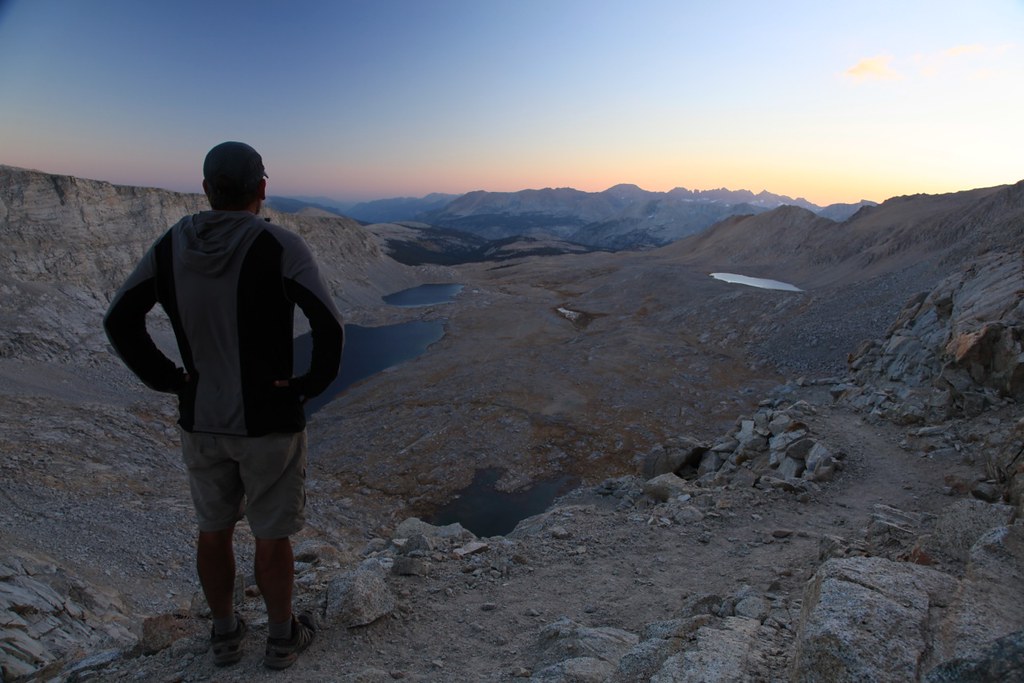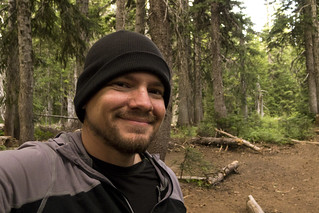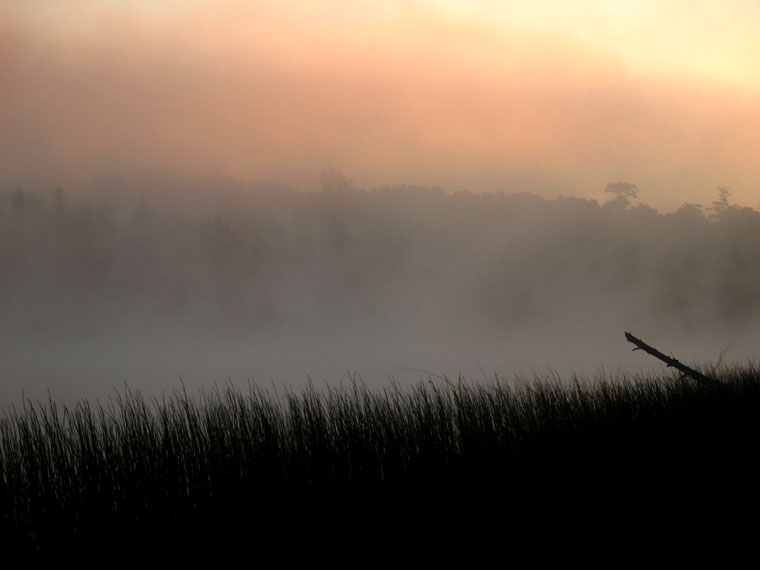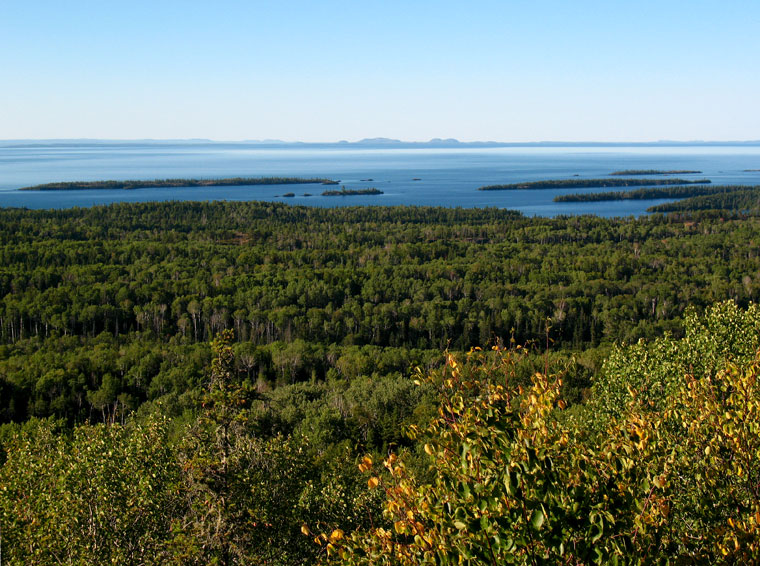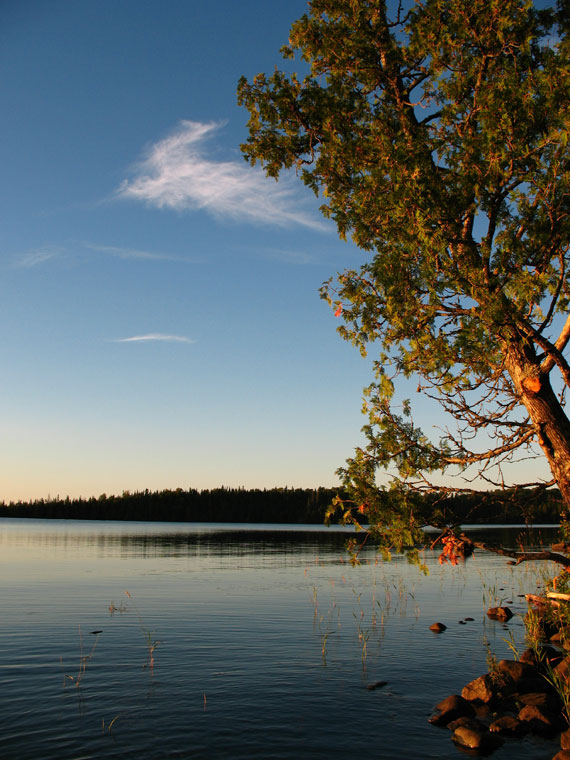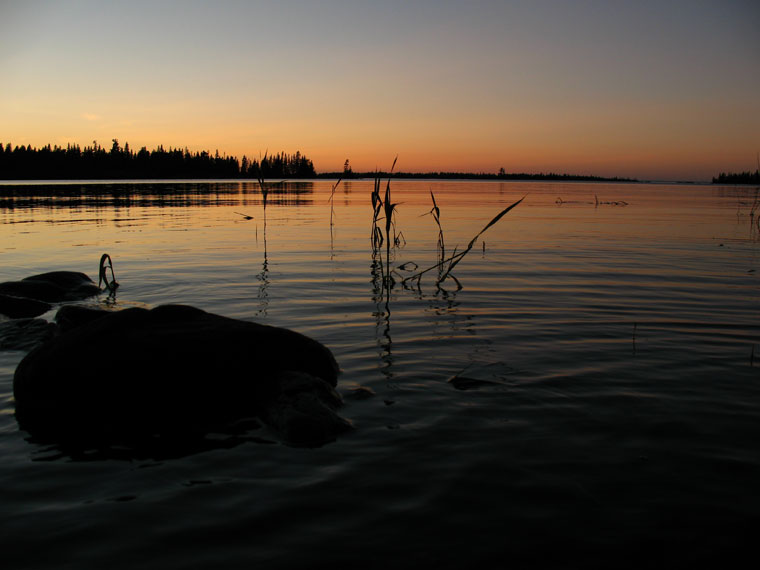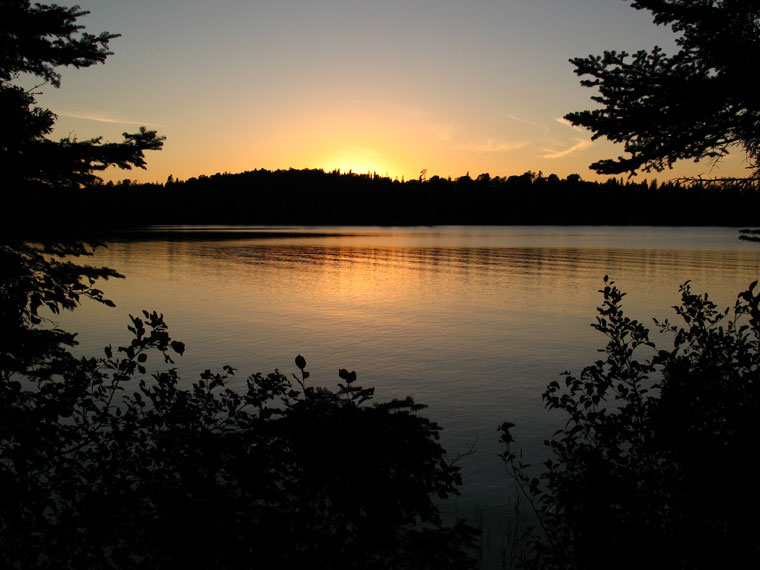Click Here for Part One
At first light, my stealthy moose search began. (I’m excited to be able to say that.) I crossed over moose-created paths and over puddles from moose-created footprints. It was chilly, about 47 degrees. A thick fog was drifting across the lake reflecting a peach sky. A river otter was enjoying an early morning cold swim. I stood patiently by the lake with my camera, but there were no moose to be seen.
I went back to camp and lounged in my hammock listening to the early birds. Their songs are a little different this far north. “Burlap, burlap.” “Tweep, tweep,” some birds said, with crazy northerner accents. I moved back to my cozy tent and sleeping bag to warm up. Apparently too cozy, I slept for an additional four hours. The day started late. I didn’t get on the trail until 1:30 and I had over thirteen miles to travel. I intended to start at a decent time, so much for that.
My next target was Lane Cove via the Greenstone Ridge Trail. It was rougher and didn’t look as manicured as the previous trails, but the views were amazing. As I got to the top of the first overlook, I was stunned. My tense body slumped as I exhaled a “wow”. I had no idea there would be such views or that the ridge would be over 1,000 feet high. There is something to be said for under planning and letting yourself be surprised. (Pictures can’t do it justice.)
I could see many small islands out in the lake and a hazy Canadian shore. I joined a fellow hiker and sat on the edge of exposed bedrock with my feet hanging over the side. He was on day 2 of 16. We talked for a few minutes. He wasn’t carrying a lot of food but would instead go fishing each night to catch dinner. He gave me some information about the trip to Lane Cove and continued on his way. I stayed there for a little while longer to take it all in. I knew I didn’t have a lot of daylight left, but to hell with deadlines, I have a headlamp.
I could see many small islands out in the lake and a hazy Canadian shore. I joined a fellow hiker and sat on the edge of exposed bedrock with my feet hanging over the side. He was on day 2 of 16. We talked for a few minutes. He wasn’t carrying a lot of food but would instead go fishing each night to catch dinner. He gave me some information about the trip to Lane Cove and continued on his way. I stayed there for a little while longer to take it all in. I knew I didn’t have a lot of daylight left, but to hell with deadlines, I have a headlamp.
This was not the only excellent lookout from Greenstone Ridge. Much of the 10 miles I spent on it today were in view of the Lake nearly a thousand feet below. I climbed the fire tower on Mount Ojibwa, trying to get as high as possible, and took a few photos. I could see the Rock Harbor lighthouse over a mile away. I was beginning to fall in love with this place. A couple of generations ago many people fought long and hard to turn this into a national park, to protect it from overfishing, logging, the building of resorts, and other financial exploitations. I now sensed a connection with those people. I understood. I would have been fighting alongside them.
More trails of that seemingly landscaped splendor was back on my decent to Lane Cove. I was exhausted, however, and the mosquitoes were bad so I was beginning to get a bit frustrated and ready to be finished for the day.
Everything was moist and covered in a thick green moss. Sage green lichens draped Birch trees. Long foot-wide planks occasionally raised you up off the wet ground to both keep you out of mud and to protect the land below.
More trails of that seemingly landscaped splendor was back on my decent to Lane Cove. I was exhausted, however, and the mosquitoes were bad so I was beginning to get a bit frustrated and ready to be finished for the day.
Everything was moist and covered in a thick green moss. Sage green lichens draped Birch trees. Long foot-wide planks occasionally raised you up off the wet ground to both keep you out of mud and to protect the land below.
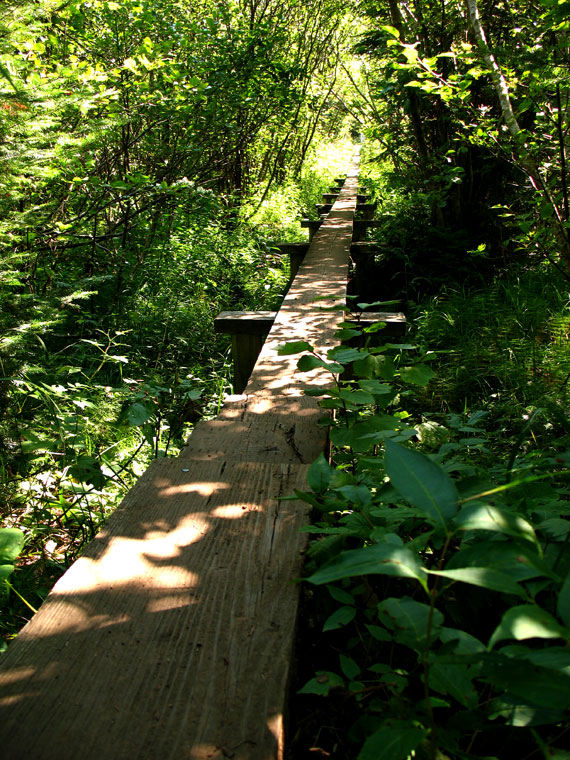 A particularly long thirty yard stretch of these boards was about two feet off the ground. A heavy pack can pull you down if you lean to one side too much. That combined with a nervousness of falling and the constant swatting of mosquitoes, I felt like I was on one of those Japanese game show obstacle courses. I could hear the announcer in my head as I walked across. “Alright and he’s off, over the balance beam, crossing the stagnant water pit of snakes, uh oh he’s crouching down to take a picture of a pretty S-shaped snake laying in the water, a potentially devastating choice as this could compromise his stability, there’s a massive hit on his right by the mosquito swarm, that frantic swatting is going to cost him his sense of balance, but wait a minute, he’s back up and he finishes in record time! Stay tuned for more Super Happy Joy Fun Show!”
A particularly long thirty yard stretch of these boards was about two feet off the ground. A heavy pack can pull you down if you lean to one side too much. That combined with a nervousness of falling and the constant swatting of mosquitoes, I felt like I was on one of those Japanese game show obstacle courses. I could hear the announcer in my head as I walked across. “Alright and he’s off, over the balance beam, crossing the stagnant water pit of snakes, uh oh he’s crouching down to take a picture of a pretty S-shaped snake laying in the water, a potentially devastating choice as this could compromise his stability, there’s a massive hit on his right by the mosquito swarm, that frantic swatting is going to cost him his sense of balance, but wait a minute, he’s back up and he finishes in record time! Stay tuned for more Super Happy Joy Fun Show!”The mosquitoes were so annoying, that I began referring to them as skeeters, which is the derogatory slur to use when wanting to intentionally show them disrespect. I was constantly smacking and swatting at them. I really don’t like killing anything. I don’t even kill insects in my house. Some I give sanctuary, others I carefully pick up and set them outside in the safety of a bush. Nonetheless, with mosquitoes, I got a definite sense of satisfaction when killing one. Sorry skeeters, but nobody likes you.
By the time I arrived at Lane Cove, the mosquitoes were mostly gone. The frustration instantly eroded and I was thrilled that I chose to hike the extra two and a half extra miles to get here. The site bordered the cove and the view pointed towards the opening into Lake Superior. The water was shallow for several feet so provided plenty of room for wading and rinsing off. I set my gear down, put on my water shoes, and headed into the lake.
 The water was very cold. Superior is always cold. The average yearly temperature is in the 40s or 50s. It was a bit warmer now however, but probably only in the low-60s. I walked out until I was thigh deep and started to shiver, but it felt great. I hesitated due to the cold but I wanted to be submerged. Before I could think about it too much, I held my breath and went under. It was exhilarating at first. I became acclimated just enough to tolerate it but never fully. I swam further out. My head popped above the surface while treading. I breathed air into my tightened lungs with short, almost hyperventilating breaths. Obviously, I’m not use to this.
The water was very cold. Superior is always cold. The average yearly temperature is in the 40s or 50s. It was a bit warmer now however, but probably only in the low-60s. I walked out until I was thigh deep and started to shiver, but it felt great. I hesitated due to the cold but I wanted to be submerged. Before I could think about it too much, I held my breath and went under. It was exhilarating at first. I became acclimated just enough to tolerate it but never fully. I swam further out. My head popped above the surface while treading. I breathed air into my tightened lungs with short, almost hyperventilating breaths. Obviously, I’m not use to this.I went back under and moved to shallower water so I could stand. I took a few more breaths, went under again, and swam towards the shore until my hands and knees were grazing large fist sized rocks on the bottom. It felt incredible. A cold swim after a few days of backpacking under a layer of sweat and grim is one of life’s most invigorating moments. I rolled onto my back then to a sitting position for a couple minutes before I would go dry in the sun.
There wasn’t much daylight left, so I started to prepare camp. Periodically I’d stop to admire the sunset. After finally making myself at home, I laid on my back on a bench made of a large log planed down so it was flat. My head rested on my hands with fingers intertwined. I realize that the rush of the day is not for me. I wish I had gotten here earlier. My previous treks have been too hurried, this day included. That is not why I hike, not why nature draws me in. This was it, this simplicity, this kind of moment. (Am I paying attention to it?)
When I look up at the sky, I'm reminded that in over four billion years it has never looked exactly the same way. The clouds arranged in this particular combination of shapes and colors, moving in this particular way, will only exist at this moment and never again. I wish I could always remember that when I need to slow things down, live in the present and see something new, I simply have to look up.
I roll over onto my side, hand now propping up my head, occasionally scribbling in my journal. I concentrate on the feeling of tall grasses touching my skin, the smell of dirt, and start to see just how much is going on all around me. Paying attention to the little things I normally block out is another way to slow things down and to live in the moment.
Over green chlorophyll and soil, an insect is living out his days with a struggle, drama, and determination that I cannot even imagine. It’s common to see the plants, not as living things, but as lifeless as gravel or mud, even though we share DNA. If they moved at a faster time-lapse pace that I could easily see, turning their leaves quickly towards the sun and roots slithering under our feet, how different would they seem? Would I give them personality? Would I talk to them and give them names? Would I think twice before picking a flower?
The diversity and cooperation between plants on the island is also admirable. There are species that wouldn’t ordinarily be able to survive on Isle Royale due to its poor soil quality with low levels of nitrogen. Some species of plants however, convert the nitrogen in the air, and put some back into the soil in forms other plants can use to survive. Below me, even though I can’t see it, I know this overlooked world exists buried under several tons of dirt, roots, stones, bedrock, and water, churning away unknowing and selflessly keeping everything alive and growing here on the surface.
Over green chlorophyll and soil, an insect is living out his days with a struggle, drama, and determination that I cannot even imagine. It’s common to see the plants, not as living things, but as lifeless as gravel or mud, even though we share DNA. If they moved at a faster time-lapse pace that I could easily see, turning their leaves quickly towards the sun and roots slithering under our feet, how different would they seem? Would I give them personality? Would I talk to them and give them names? Would I think twice before picking a flower?
The diversity and cooperation between plants on the island is also admirable. There are species that wouldn’t ordinarily be able to survive on Isle Royale due to its poor soil quality with low levels of nitrogen. Some species of plants however, convert the nitrogen in the air, and put some back into the soil in forms other plants can use to survive. Below me, even though I can’t see it, I know this overlooked world exists buried under several tons of dirt, roots, stones, bedrock, and water, churning away unknowing and selflessly keeping everything alive and growing here on the surface.
Just as important is the microscopic life, which is so abundant that if everything we can observe with the naked eye were to disappear, we would still see ghostly outlines of it constructed out of trillions of bacteria and nematodes.
The lichens covering the trees and rocks look like a single organism, but are actually comprised of fungus with algae or cyanobacteria, or both. The fungus provides structure and nitrogen allowing the algae or cyanobacteria to photosynthesize and provide food for the fungi. One would not survive in this beautiful form without the other. Lichens are fungi that discovered agriculture, as one lichenologist put it. This delicate cooperation illustrates both the strength and endurance of the island but also the fragility and teamwork required to maintain it.
So much of this activity is going on continuously, and yet, I typically fail to pay attention to it. It’s a magnificent world and largely ignored in the course of the average day. An essentially useless dollar bill unclaimed blows across a parking lot, and most of us will go out of our way to chase it down. At the same time fail to see the priceless things always around us, each one blocked out as repetitive and insignificant.
The sun was now set, the clear sky still a bright but now darkening blue. The absence of moon and city light made every possible star visible. Periodic breezes hissed through the pines and water gurgled against the rocks on the shore. This is the time of my life.
SMACK, the sound of another dying mosquito. “Thought you were going to bite me, huh? Skeeta please.”
I moved to my tent to be away from them, so they wouldn’t take away from this moment. I sat up late reading and writing. Occasionally I’d lie on my back to gaze up at the unusual amount of stars that I normally can’t see at home. Complete darkness is something I forgot how to appreciate.
< Part Three | Part Five >
The lichens covering the trees and rocks look like a single organism, but are actually comprised of fungus with algae or cyanobacteria, or both. The fungus provides structure and nitrogen allowing the algae or cyanobacteria to photosynthesize and provide food for the fungi. One would not survive in this beautiful form without the other. Lichens are fungi that discovered agriculture, as one lichenologist put it. This delicate cooperation illustrates both the strength and endurance of the island but also the fragility and teamwork required to maintain it.
So much of this activity is going on continuously, and yet, I typically fail to pay attention to it. It’s a magnificent world and largely ignored in the course of the average day. An essentially useless dollar bill unclaimed blows across a parking lot, and most of us will go out of our way to chase it down. At the same time fail to see the priceless things always around us, each one blocked out as repetitive and insignificant.
The sun was now set, the clear sky still a bright but now darkening blue. The absence of moon and city light made every possible star visible. Periodic breezes hissed through the pines and water gurgled against the rocks on the shore. This is the time of my life.
SMACK, the sound of another dying mosquito. “Thought you were going to bite me, huh? Skeeta please.”
I moved to my tent to be away from them, so they wouldn’t take away from this moment. I sat up late reading and writing. Occasionally I’d lie on my back to gaze up at the unusual amount of stars that I normally can’t see at home. Complete darkness is something I forgot how to appreciate.
< Part Three | Part Five >
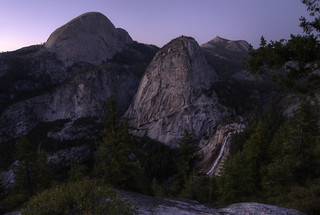
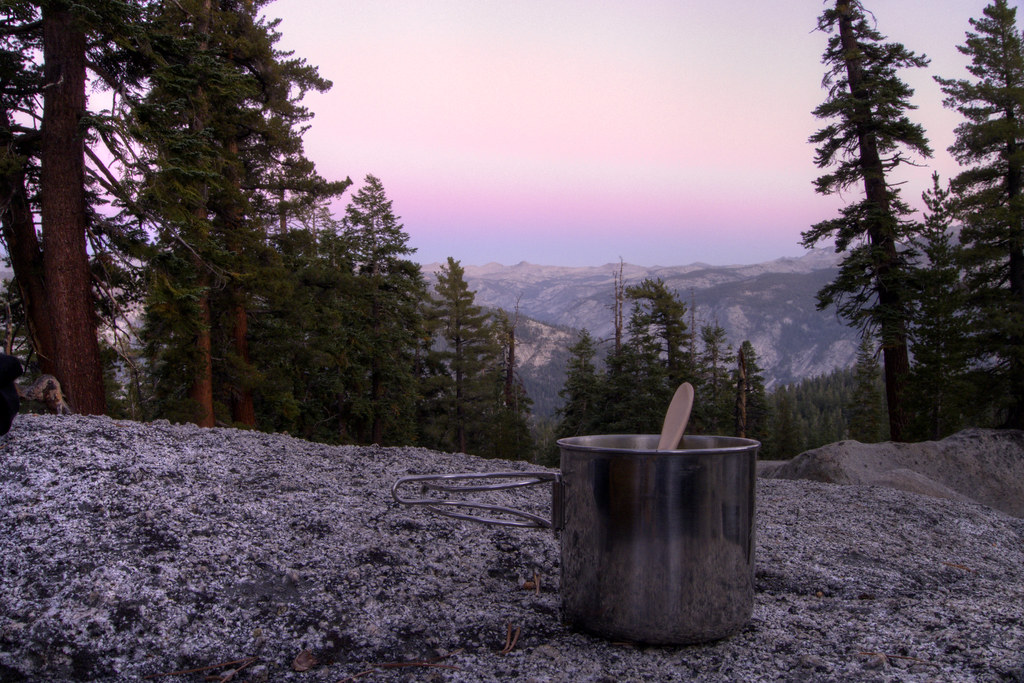
com-s.jpg)
com-s.jpg)
com-s.jpg)
com-s.jpg)
